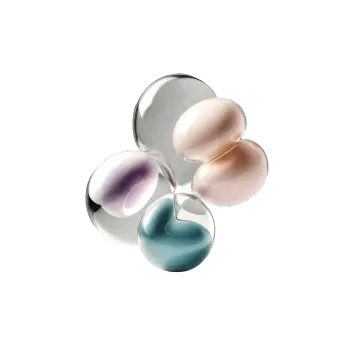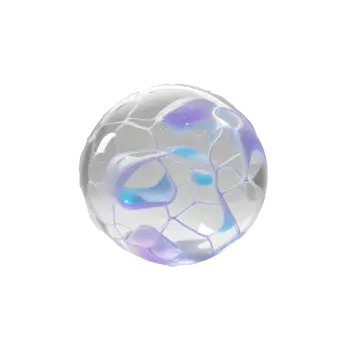When will I enter menopause?
Menopause is the period in a woman's life that occurs a few years before the last menstruation and continues for some time after the period has stopped. The period when your menopause journey starts is completely individual, but it probably occurs sometime between the ages of 40 and 60, in the Nordics the average age is 51. Menopause can be divided into three main phases:
Perimenopause
This phase begins a few years before the last menstruation and lasts on average between four and ten years. During this period, many women experience major hormonal changes and altered bleeding patterns. Menstruation can become both more frequent and less frequent than before.Menopause
occurs when the last menstrual period has taken place and a full year has passed without any menstrual bleeding. This marks the end of the fertile period in women.Postmenopause
This phase begins after menopause and lasts for the rest of life. During this time, some menopausal symptoms continue for a few years, but the ovaries gradually produce less estrogen and hormone levels remain low.- Age: Menopause is a normal part of aging and usually occurs sometime between the ages of 40 and 60.
- Genetics: Family history can be an indicator of when you can expect to enter menopause. If your mother, sister or grandmother went through menopause at an early age, it is possible that you will too.
- Smoking: Smoking can affect aging and can lead to an earlier menopause.
- Lifestyle factors: Certain lifestyle factors, such as obesity and lack of physical activity, can affect hormone balance and thus accelerate menopause.
- Health conditions: Certain medical conditions and treatments, such as chemotherapy or surgical removal of the ovaries, can affect the function of the ovaries and thus cause an earlier menopause.
- Irregular bleeding: During perimenopause, the menstrual cycle may become irregular, with more frequent or less frequent bleeding than before.
- Hot flashes: Hot flashes are a common symptom of menopause and are characterized by sudden and intense heat changes, often followed by sweating and sometimes palpitations.
- Sleep problems: Many women experience difficulty falling asleep or sleeping through the night during menopause. This may be related to hot flashes or other menopausal symptoms.
- Decreased energy and fatigue: Hormonal changes can lead to a feeling of fatigue and decreased energy during menopause.
- Mood swings: Menopause can affect mood and lead to mood swings, irritability and low mood.
- Weight gain: Changes in hormone balance can affect metabolism and lead to weight gain, especially around the waist.
- Depression and anxiety: Menopause can affect mental health and lead to depression, anxiety and feelings of discomfort.
- Difficulty concentrating: Some women experience difficulty concentrating and memory problems during menopause.
- Decreased sex drive: Changes in hormonal balance can affect sex drive and lead to reduced libido.
- Dry mucous membranes: Decreased estrogen levels can lead to dry mucous membranes in the vagina, which can cause discomfort during intercourse.
Causes of menopause
Menopause is a natural part of aging for women and is due to a gradual decrease in sex hormones, primarily estrogen andprogesterone in the body. However, there are certain factors that can speed up or affect the onset of menopause, below are some of the most common causes:
Common symptoms of menopause
Menopause can give rise to a range of different symptoms, both physical and psychological. It is important to remember that all women may experience menopause differently and that the symptoms may vary in intensity and duration. Here are some common symptoms of menopause:
Physical symptoms
Psychic symptoms:
Treatment of menopausal symptoms
If you also experience troublesome symptoms during menopause, there are several different treatment options that can help alleviate it. However, it is important to discuss your symptoms and treatment options with a doctor to find the best solution for you. Here are some common treatment options for menopause:
Hormonal treatment in menopause
Hormonal treatment, also known as HRT (Hormone Replacement Therapy) can be used to relieve symptoms such as hot flashes, sleep problems and dry mucous membranes. HRT involves taking estrogen supplements, either through tablets, patches or gel. In some cases, progestogens (luteinizing hormone) may also be recommended for women with an intact uterus to reduce the risk of uterine cancer.
However, it is important to remember that HRT can cause side effects, so it should be used with caution and under the supervision of a doctor.
Local treatment
Local treatments can be used to relieve symptoms such as dry mucous membranes and abdominal discomfort. This may include the use of creams, ointments or vaginal tablets that contain estrogen.
Lifestyle changes
Making certain lifestyle changes can also help relieve menopause symptoms. This can include eating a balanced diet, regular physical activity, managing stress and avoiding smoking and excessive alcohol consumption.
Alternative treatments
Some women choose to use alternative treatments such as herbal medicine or dietary supplements to relieve menopausal symptoms. It is important to discuss these treatments with your doctor before starting to use them to ensure they are safe and effective. Another recommendation is to test your values regularly even before you make a decision about which treatment(s) you choose to implement and afterwards for follow-up purposes.
Conclusion
Menopause is a natural part of a woman's life and involves a change in the hormonal balance in the body. It can give rise to a range of different symptoms, both physical and psychological. By understanding menopause and its symptoms, you can take control of your health and choose the best treatment options to relieve your symptoms. Remember to always consult a doctor for individual advice and support during this time in your life.


























